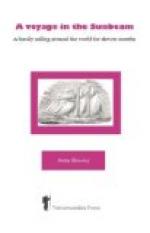[Illustration: Waiting for the Train, Chili.]
Saturday, October 21st.—Having wished good-bye to Mr. Mackay, and taken our seats in the train for Linares, we were now fairly launched on our own resources in a strange country, I being the only one of the party who could speak even a little Spanish. At San Romde we stopped half an hour to allow the train from Chilian to pass. Most of the passengers took the opportunity of breakfasting, but as we were not hungry we occupied the time in having a chat with the engine-driver, a very intelligent Canadian. He told us that, as it happened, we might have gone to Angol to-day after all, as a special car and engine were going there to take a doctor to see a patient, returning early to-morrow morning.
The railroad runs alongside the Bio-Bio all the way to San Romde. On either bank are low wooded hills, on whose sides vines are cultivated in considerable quantities. The wild flowers grow luxuriantly everywhere: calceolarias, especially, in huge bushes of golden bloom, two or three feet high. At San Romde we left the river, and travelled through a pretty and well-cultivated country to Chilian, which derives its name from an Indian word, signifying ‘saddle of the sun,’ and is so called from the fact that the sun shines upon it through a saddle-shaped pass in the chain of the Andes.
Like Concepcion, the existing town has been recently built at a distance of about a mile from the remains of the old place of the same name, which was overthrown by an earthquake about thirty years ago. The destruction was, however, not so complete as in the case of Concepcion, and some few of the better-conditioned houses are still inhabited by very poor people, though the walls have great cracks in them from top to bottom, and they are otherwise in a deplorable state. A large cattle and horse market is held at Chilian every Saturday, and it is said that, on these occasions, 100,000 dollars frequently change hands in the course of the morning, in the open market-place. All the business of the day was over by the time we got there, and there was nothing to be seen but a few stray beasts and quaint bullock-carts, and some peasants selling refreshments, minaque lace, and other trifles. In several of the old-fashioned shops on the Plaza there were curious-looking stirrups, bits, spurs, and other horse-gear, all made of solid silver, roughly worked by the Indians themselves.
Having had our baths, we returned to the hotel, where we found dinner laid out in my bed-room, which happened to be the largest, for our host did not approve of our dining at the table-d’hote, as we should have preferred to do. He gave us an excellent dinner, with good wine, and attended to us most assiduously himself.




